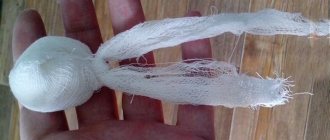Causes of fibroids
Myoma is a benign neoplasm that depends on hormones and is concentrated in the muscular layer of the uterus. It consists of fabric fibers that are woven randomly into a knot. At first, the tumor is a single nodule and is not accompanied by any symptoms. But if the tumor is not detected in a timely manner and treatment is not started, then after some time the tumor will greatly increase in size and then it will be more difficult to get rid of it.
In most cases, fibroids are diagnosed in women of childbearing age over 35 years of age, but although they are less common, they can still appear in younger women.
There are several causes of fibroids:
- Hormonal imbalance. When the level of estrogen and progesterone in the female body increases, lumps form at an accelerated pace and this is how a benign neoplasm arises. It can be eliminated during pregnancy or breastfeeding.
- Injury to the uterine cavity . It can occur as a result of abortion, difficult or frequent childbirth, installation of an IUD, surgery performed by an inexperienced doctor, and other actions that violate the integrity of the mucous membrane of the reproductive organ and lead to the formation of microcracks. Over time, muscle and connective tissue begins to grow in the damaged areas, serving as the basis of leiomyoma.
- Irregular sex life and lack of orgasm. In a woman who lives without sexual intercourse for a long time, arterial blood stagnates in the pelvis. This condition becomes chronic, due to which the amount of hormones in her body changes and a compaction appears, which is benign in nature.
- Poor nutrition. By eating foods of poor quality, a woman provokes a deterioration in her condition and the development of various diseases that significantly reduce her quality of life. Most often, pathogenic neoplasms develop due to the consumption of excessively fatty and sweet foods, which also provoke weight gain.
In addition, a woman’s hormonal levels can change for a number of psychological reasons, which include:
- being in constant depression;
- loss of a loved one;
- changing of the living place;
- lack of active recreation in good company.
The risk of developing fibroids increases significantly with:
- hypertension;
- genetic predisposition;
- high blood sugar;
- overweight;
- disrupted exchange process;
- early menopause.
Treatment methods without surgery
It is possible to use methods of non-surgical treatment of fibroids only in cases of its diagnostically confirmed benignity. At the slightest suspicion of tumor malignancy, surgery is prescribed. It is impossible to treat fibroids conservatively if they have reached a size beyond 12-15 weeks of pregnancy.
Drug therapy
Treatment of myomatous tumors with hormonal drugs is aimed at eliminating the steroid effect on tumor tissue in the uterus. Medicines are used that either suppress the functioning of the endocrine glands responsible for the synthesis of sex hormones, or compete with the hormones themselves for binding to receptors.
The main hormonal drugs for the conservative treatment of fibroids are:
- Gestagens. Synthetic analogues of progesterone, when taken for a long time, reduce the production of the ovaries' own hormones. This stabilizes the growth of fibroids, helps prevent its active development and eliminate the accompanying symptoms. Their use is possible in women of reproductive and perimenopausal ages.
- Gonadotropin releasing hormone agonists. These substances are similar in structure to the hormones of the hypothalamus, which affect the functioning of the ovaries. Their intake disrupts the hypothalamic-pituitary-ovarian connection, which leads to disruption of the synthesis of estrogen and progesterone.
- Combined oral contraceptives (COCs). They contain certain doses of sex hormones that reduce the synthesis of their own steroids in the ovaries. This method, how uterine fibroids can be treated without surgery, is used in women of reproductive age.
- Antigestagens. Drugs in this group compete with progesterone for binding to fibroid receptors. This blocks the hormonal effect on the tumor tissue, which shrinks the node without the need for surgery. Used in women who have reached menopause.
To achieve results from treatment, hormones must be taken for a long time. The course of treatment is at least 6 months, followed by a control ultrasound of the small organs.
Minimally invasive treatment methods
A myomatous node requires a good blood supply for its active growth. When the branches of the uterine arteries feeding the tumor are blocked, it begins to die and quickly regress. The microsurgical operation for uterine artery embolization (UAE) is based on this principle.
Under the control of angiography (X-ray radiation of blood vessels), a catheter is inserted into the femoral artery through a small incision. It is advanced through the blood vessels to the arteries of the uterus, after which an embolic drug is injected, disrupting the blood supply to the tumor node.
The effect of the procedure develops immediately after surgery. Tissue necrosis occurs and the node undergoes degradation. At the same time, the rehabilitation period after UAE is much easier than after a standard operation, and the chances of restoring reproductive function are much higher. This method of treating uterine fibroids can be used as a preparatory method if surgery to remove large nodes is necessary.
Physiotherapeutic methods
Physiotherapy cannot be considered a complete way to cure a fibroid node without surgery. It is used as an additional treatment to hormonal therapy or in the postoperative period.
For fibroids, it is prohibited to prescribe any procedures related to increased blood supply to the pelvic organs, vibration and heating effects.
Electrophoresis with zinc and copper ions has a positive effect on the exchange of sex hormones and the reduction of inflammation. It is also possible to use magnetic therapy, which acts on the tumor, achieving regression, and helps in treating its symptoms.
Hirudotherapy
The method of treatment with leeches has been known since the times of ancient healers. Hirudotherapy has an analgesic and anti-inflammatory effect, which has a beneficial effect on the health of the patient with fibroids, subject to mandatory medication treatment.
Treatment with leeches is prohibited in the following cases:
- Development of anemic syndrome.
- Tendency to hypotension (low blood pressure).
- Blood clotting disorder.
- Malignant nature of the tumor.
The effect of homeopathy on fibroids
Treatment of fibroids with homeopathy over a long period of time can give different results:
- Normalize the psychological state . As is known, excessive nervousness contributes to the accelerated growth of tumors due to a stronger hormonal imbalance.
- Stimulate the production of gestagens . Their deficiency, together with hyperestrogenism, contributes to the formation of compactions. The ratio of hormones is restored, and the stimulus for growth and nutrition in myomatous nodes disappears.
- Normalize blood circulation and functioning of the cardiovascular system . Under no circumstances should the tumor be supplied with oxygen and thereby accelerate its development. And homeopathy helps to reduce blood flow at the location of the fibroids.
- Eliminate anemia . Homeopathic medicines contain components that stimulate the production of hemoglobin. There is an improvement in well-being.
- Reduce blood loss . With fibroids, the tumor puts pressure on a large number of blood vessels and damages them. And homeopathy, by improving the coagulability of biological fluid, eliminates the causes of bleeding.
Patient reviews
I brought my mother to the Adonis Homeopathic Center because of fibroids. The tumor was discovered quite a long time ago, but nothing was done about it before. I was categorically against any operations because she was no longer young. Mom herself didn’t really believe in homeopathy, but the Center’s staff spoke so truthfully about the disease and its treatment that she agreed to treatment with homeopathic medicines. After the third month, almost all the unpleasant symptoms disappeared and even the menstrual cycle returned to normal. Thanks to everyone who treated someone dear to me.
Homeopathic medicines for uterine fibroids
Homeopathy in gynecology can give very good results. Thus, in the treatment of fibroids, the following drugs are most often prescribed:
- Mammosan
Granular product based on arnica, starfish and cuttlefish ink. Usually, 5-7 granules are prescribed three times a day, which must be kept in the mouth until completely dissolved. But the doctor may prescribe the drug according to a different regimen.
- Epigallate
The main component in the drug prevents cells from dividing at a high rate and stops the tumor growth process. It is recommended to take 2 capsules in the morning and evening.
- Indinol
Designed to stop tumor development and also prevent estrogen from being produced in excess. It is commercially available in the form of capsules, which should be taken twice a day, 2 pieces, with water. And taking it together with Epigallate will make the result even better.
- milife
It contains many useful minerals and amino acids that normalize immune, metabolic and endocrine processes in the body and thereby help stop the division of myometrial cells, preventing the tumor from growing. The drug is taken according to the regimen chosen by the attending physician, which he selects based on whether the patient’s fibroids are small or have already become large. Taking the drug can start with a quarter or half of a tablet, followed by an increase and then a decrease in dosage. Its amount depends on the days of the menstrual cycle.
- Aurum (Aurum)
A drug based on gold. It is intended for the treatment of fibroids that occur with changes in the ovaries, hemorrhagic syndrome and impaired blood supply in the pelvic area. This remedy is also effective in combating bleeding that occurs due to tumor growth.
- Calcium _
There are three different types:
- Calcium fluoricum - prescribed when fibroids “coexist” with mastopathy, varicose veins and adnexitis in a chronic form.
- Calcium jodatum - prescribed for the treatment of fibroids with cysts on the ovaries.
- Calcium silicatum - recommended for use by women whose fibroids have developed against the background of a severe decrease in immunity.
- Conium
Indicated for predisposition to the occurrence of tumors of various types. The pain in the affected area is pronounced, especially at night. Myoma has a dense consistency. Menstrual function is impaired, menstruation comes late. Women notice a depressed state, a fear of loneliness. They are irritable, whiny and do not want to work at all.
- Thuja
Uterine fibroids are often combined with goiter. Menstruation is disrupted and begins prematurely or, conversely, late, the discharge is very scanty. Women are distinguished by stubbornness, suspiciousness, anxiety, and the presence of obsessive ideas. They sweat a lot before their period arrives.
- ASD candles
They act as a stimulant-antiseptic and have a strong immunomodulatory effect. The duration of treatment is a month, but if necessary, the course can be increased.
- Tukofit
Vaginal suppositories with thuja extract, laconosa and hemlock. They have antibacterial, analgesic and antitumor effects.
- Ustilago (Ustilago)
Prescribed for pain, compression and the presence of nodules in the uterus. Abortion, menstruation and menopause are accompanied by blood loss, which increases with heavy lifting. The ovaries are sensitive, uterine prolapse has occurred, and leucorrhoea is present. Women with such symptoms are irritable, sad, often cry and sleep poorly. They don't like to repeat the same thing twice.
- Silisia (Silicia)
They are prescribed when during menstruation a woman breaks out in cold sweat, and in the intervals between them she develops leucorrhoea and spotting. Women are prone to developing nodules in their organs, they cannot tolerate hot food and heat, and they sweat a lot during physical activity. They are timid and submissive.
- Phosphor (Phosphorus)
Prescribed for prolonged periods with clots and bleeding in between. Women are whiny at the beginning of the cycle, and the rest of the time they are friendly, impractical, selfish and in character they are like eternal children.
- Albus Lapis (Albus Lapis)
Indicated for shooting and burning pains, as well as cancer of the reproductive organ. Menstruation is accompanied by fainting conditions. Nodules appear on the mammary and thyroid glands.
- Mastiol EDAS
A homeopathic medicine in the form of drops, which is indicated for a cyst in the mammary gland, mastopathy, a feeling of heaviness and pain. In addition, the drops improve immunity and the functioning of the nervous system, and also restore the composition of the blood and lymph.
- Milona 5 for fibroids
It is produced in the form of herbaceous tablets, which indicates that the composition of the drug is herbal and selected in such a way as to normalize women’s health and maintain the genitals in working condition. This remedy helps eliminate lumps in the mammary gland and the symptoms of menopause. In addition, it stops inflammation that develops in the pelvis, and also prevents the relapse of various diseases.
- Solgar
This homeopathic remedy is available in capsule form and is based on black cohosh root extract. It is taken according to the regimen prescribed by the attending physician.
Instructions on how to take medications
As a rule, homeopathy for fibroids is effective when the remedies are started in advance in order to normalize the cycle and avoid the appearance of nodes. You just have to take them for a long time, sometimes taking breaks. But you shouldn’t be afraid of this, because you won’t be able to get used to them.
- When uterine fibroids are combined with endometriosis , resulting from a hormonal imbalance, taking homeopathic medications will prevent the uterine nodes and endometrium from growing further. The best results will be if the development of fibroids does not exceed three months.
- Homeopathy for fibroids and menopause can be used only after being prescribed by the attending physician. As you know, postmenopausal women cannot live their usual lives for a long time, because the menopause affects their overall health and contributes to decreased performance and apathy.
- Homeopathy for large uterine fibroids can also be used, although it is much more difficult to eliminate such fibroids with herbal preparations. In most cases, doctors decide to treat fibroids with hormones or surgery.
Scope of application of alternative agents for myomatous nodes
Treatment with homeopathic remedies is very popular, and there are reasons for this:
- The proposed drugs do not have a negative effect on the body and are therefore significantly inferior to hormonal drugs against fibroids. Alternative methods do not affect weight and metabolism, psycho-emotional state, or the functioning of healthy organs;
- Homeopathic medicines have virtually no contraindications and rarely cause adverse reactions;
- An individual treatment regimen is selected for each patient, which is not typical for traditional medicine;
- It is believed that homeopathy treats not a disease, but a person, and allows you to eliminate several pathological conditions at once.
According to reviews, homeopathic granules can save a woman not only from fibroids, but also from other diseases - mastopathy, endometrial polyps, chronic endometritis, ovarian cysts, endometriosis.
Many women who took homeopathic medicines noted positive effects in the treatment of gynecological diseases.
Proponents of alternative medicine promise that after a course of therapy the disease will go away and surgery will not be needed. Gynecologists observing women with fibroids do not agree with this statement and point out that homeopathic remedies can only be used in certain situations.
Indications for homeopathic treatment for leiomyoma:
- Small fibroids (up to 2.5 cm) with minimal clinical manifestations;
- The period of preparation for surgical treatment of the tumor (in combination with other drugs);
- Condition after surgical treatment (rehabilitation);
- Myoma in menopause, not prone to further growth.
Homeopathic remedies can have a positive effect either for minor fibroids and not advanced conditions, or in combination with traditional treatment.
In these situations, homeopathic medicines do not directly affect the growth of the node, but perform other tasks:
- Helps strengthen the immune system;
- Increases the overall tone of the body;
- Normalize the activity of the nervous system, eliminate increased excitability and anxiety.
Using the method of individual selection of homeopathic remedies puts the patient at ease and improves his mood for recovery.
Contraindications for the use of homeopathic medicines:
- Medium and large fibroids (from 3 cm);
- Rapid growth of the node (from 4 weeks per year);
- Frequent and heavy uterine bleeding leading to anemia;
- Development of complications of the disease: compression of the pelvic organs, tumor necrosis, birth of a submucosal node and others;
- Suspicion of a malignant tumor (sarcoma).
In these situations, abandoning the methods of traditional medicine in favor of dubious homeopathy threatens with serious consequences for health and even life.
If complications develop, you should always act according to the prescriptions of traditional medicine.
It is also useful to read: Sizes of uterine fibroids for which surgery is indicated
Doctors' opinion
Experts consider homeopathy to be a fairly effective way to treat benign tumors in the female reproductive organs. It can be prescribed to patients of different ages, but the results of such therapy will be more noticeable with small nodes.
For medium-sized nodes, doctors recommend combining homeopathy with hormonal medications. After this course, patients note an improvement in their condition, the disappearance of pain and an increase in sexual desire.
Doctors are confident in the effectiveness of homeopathic remedies, but recommend taking them only as prescribed by a gynecologist and under his strict supervision.
Progestins
The drugs are also called “pure gestagens”, since they contain pure progesterone. For the treatment of uterine fibroids, they are used to suppress the hormone estrogen and maintain pregnancy when there is a risk of miscarriage due to progesterone deficiency or to treat endometriosis.
Well-known drugs in this series include:
- Visanne or Femoston. The drug affects the growth of the endometrium and stops menstruation;
- Orgametril. It is used only in the first phases of uterine fibroids, is effective in cases of heavy bleeding, and is used to stop the appearance of foci of endometriosis;
- Duphaston. It affects only the endometrium and has a gentle effect.
Hormone replacement therapy
It is used in women during menopause, facilitating its course. During menopause, the growth of myomatous nodes slows down or stops, due to changes in hormonal balance. The advisability of using replacement therapy for uterine fibroids is determined by a specialist after a thorough examination. During menopause, a woman’s body produces not only less of the female sex hormone - estrogen, but also its weaker form - estrone. Thanks to the introduction of replacement therapy, it is possible to both treat myomatous nodes and stabilize the level of female sex hormone, which allows:
- Activate brain function;
- Normalize sleep, heart rate and blood pressure;
- Strengthen collagen fibers;
- Prevent the development of atherosclerosis;
- Reduce the risk of stroke, heart attack, heart attacks;
- Eliminate unpleasant symptoms of menopause;
- Normalize thyroid function;
- Avoid weight gain under the influence of testosterone.
A large selection of hormonal replacement therapy makes it possible to select an individual course for each woman separately, which avoids side effects and increases the effectiveness of therapy.
Popular drugs are:
- Trisequence;
- Cliogest.
The drug Femoston is also used, however, its use should be under the supervision of a doctor. It is recommended only for small fibroids and in the presence of premenopausal syndrome.










